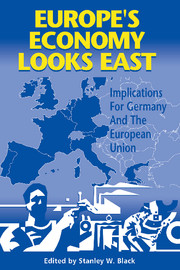Book contents
7 - Integrating the East: the labor market effects of immigration
Published online by Cambridge University Press: 03 February 2010
Summary
Introduction
East–West migration is a central theme for the EU (European Union) integration process of centralEurope. There is no doubt about the attractiveness of the political vision of integration. In the long run, there is also the economic vision of larger markets in a prosperous larger union of states. This paper argues that investing in Eastern Europe or liberalizing trade with these countries will not act quickly enough to relieve current demand for economic development and current pressure to migrate. On the contrary, a selective (at first temporary) immigration policy of the EU concerning Central Europe might be useful. It is suggested that East–West migration offers the alternative of skilled or unskilled migration and therefore introduces a new (qualitative) component to a European migration policy.
In the short run, the issue is dominated by the problem of economic transition to a market economy in the East and from high levels of unemployment to lower levels in the West. In spite of the current economic crisis in the West with its 19 million unemployed in the EU in 1993, there are substantial economic East–West differences. However, it is unclear to what extent these differences cause out-migration. Previous experience with inner West European migration suggests that labor mobility is rather slow in adjusting wage and unemployment differentials. The experience so far with the anticipated mass migration from the East confirms this view. Nevertheless, the high unemployment rates in the West, larger than 10 percent in the EU in 1993, feed the emotional debates on migration in the West and the reluctance of policymakers to consider economic migration policies.
- Type
- Chapter
- Information
- Europe's Economy Looks EastImplications for Germany and the European Union, pp. 269 - 306Publisher: Cambridge University PressPrint publication year: 1997
- 3
- Cited by



